人教版(2019)选择性必修第三册Unit 5 Poems Learning about language 课件(共58张PPT)
文档属性
| 名称 | 人教版(2019)选择性必修第三册Unit 5 Poems Learning about language 课件(共58张PPT) | 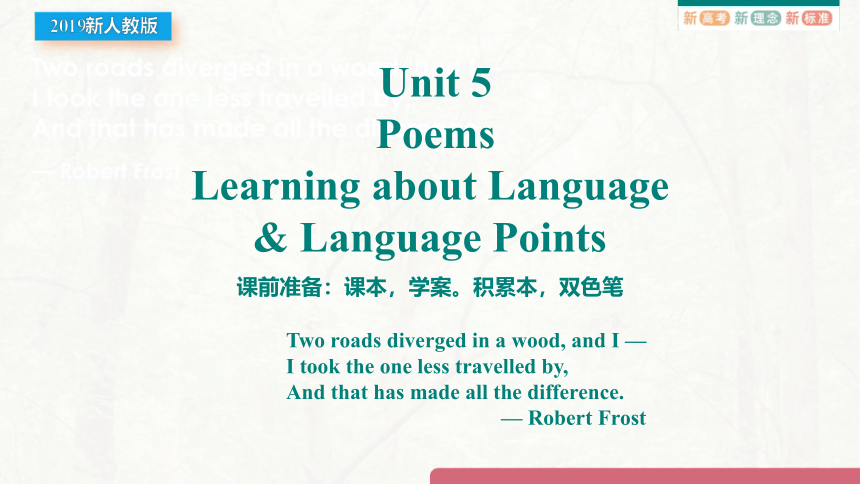 | |
| 格式 | PPTX | ||
| 文件大小 | 7.0MB | ||
| 资源类型 | 教案 | ||
| 版本资源 | 人教版(2019) | ||
| 科目 | 英语 | ||
| 更新时间 | 2024-04-19 11:19:26 | ||
图片预览

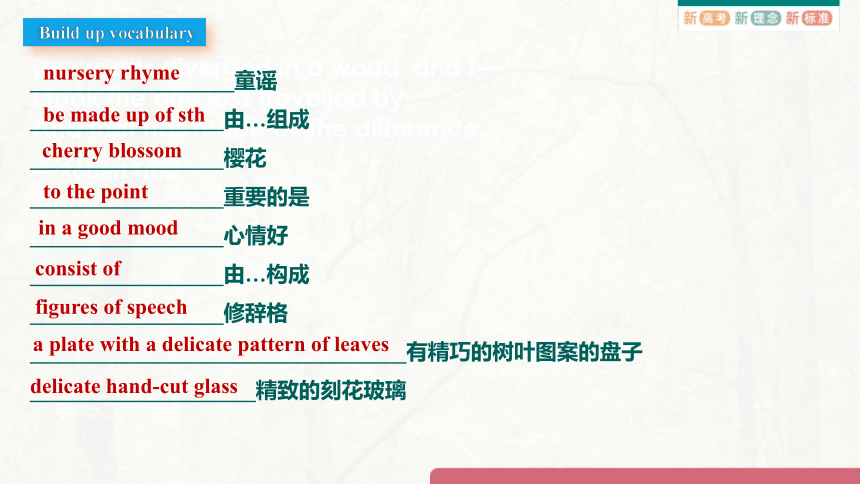
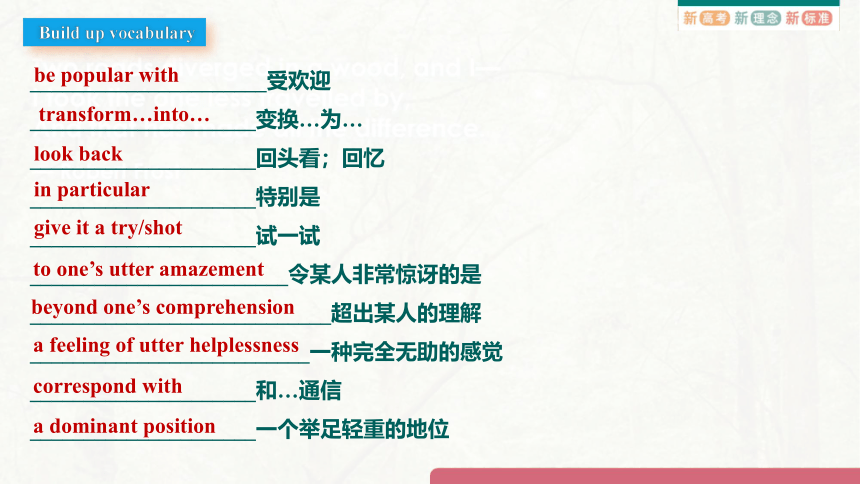
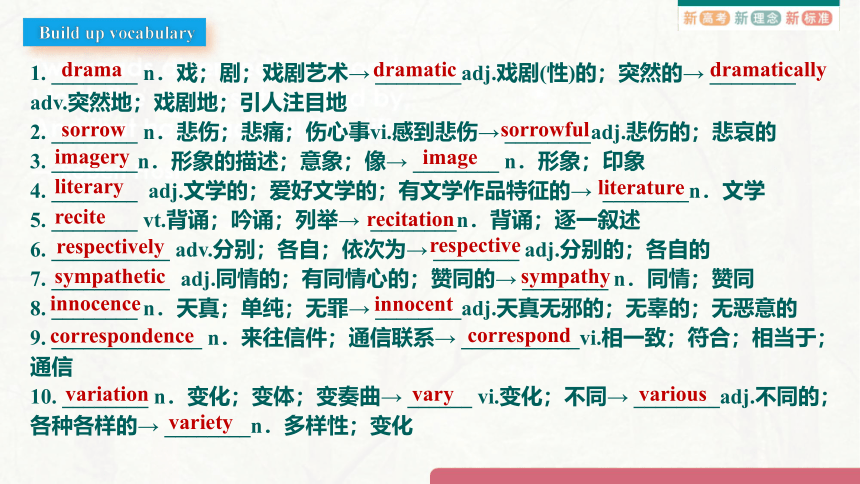
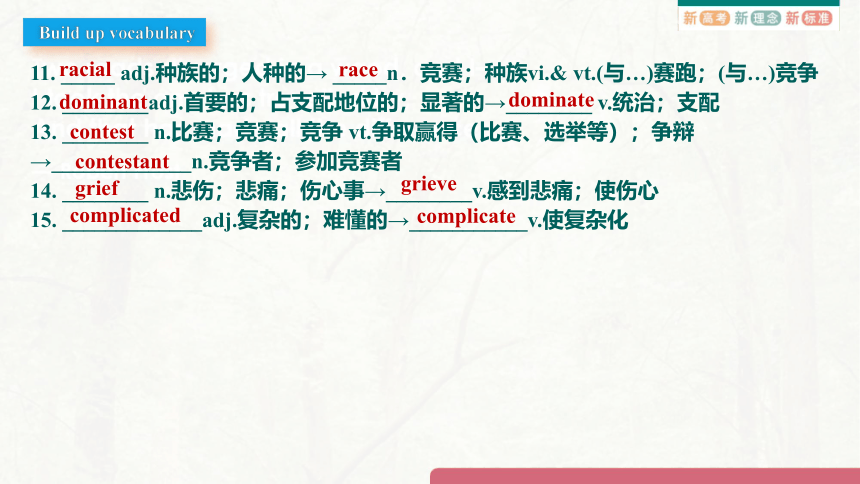
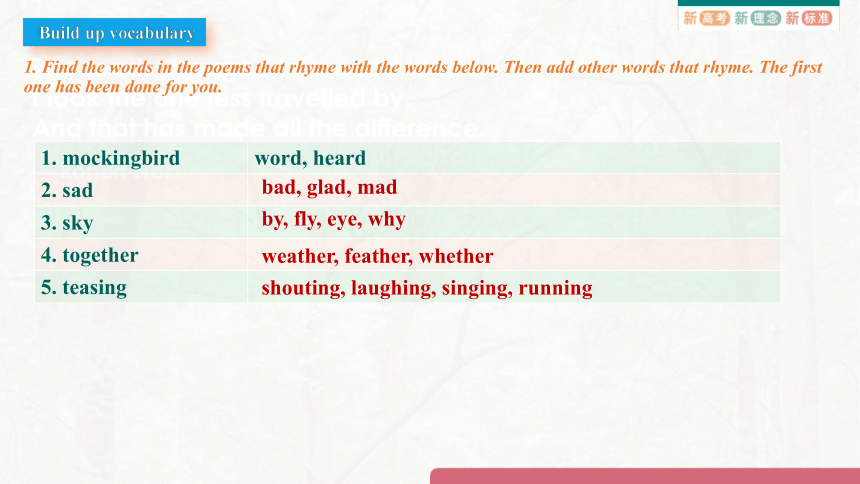
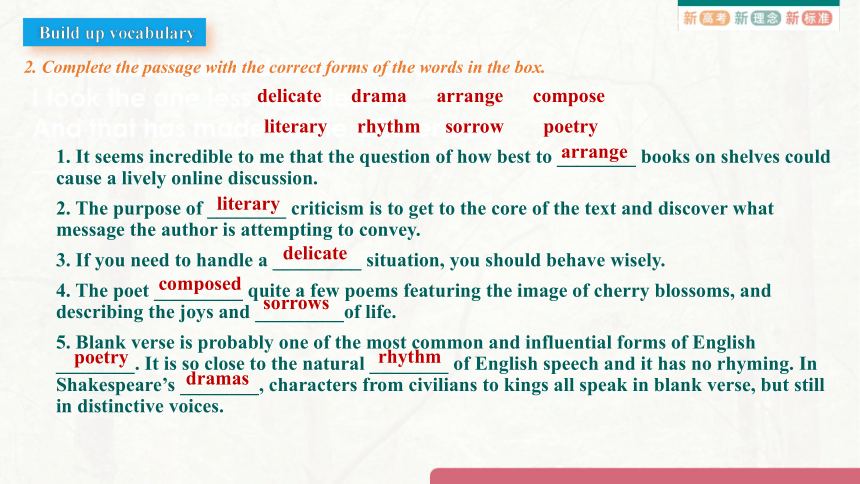
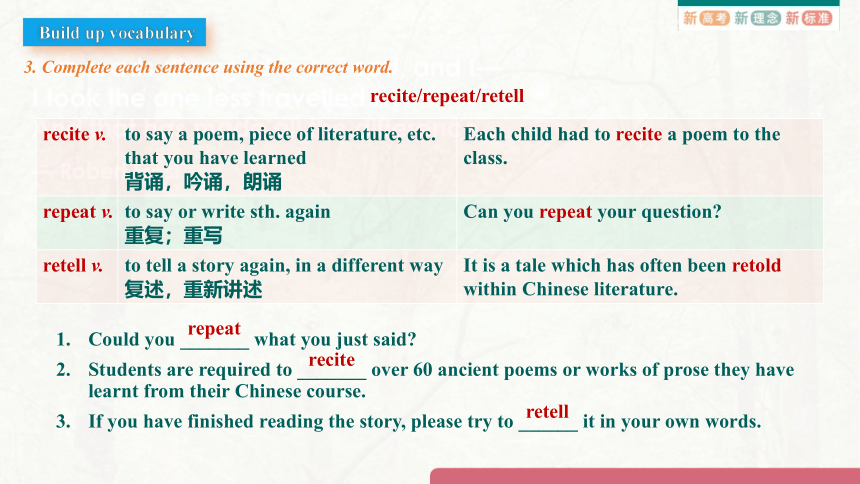
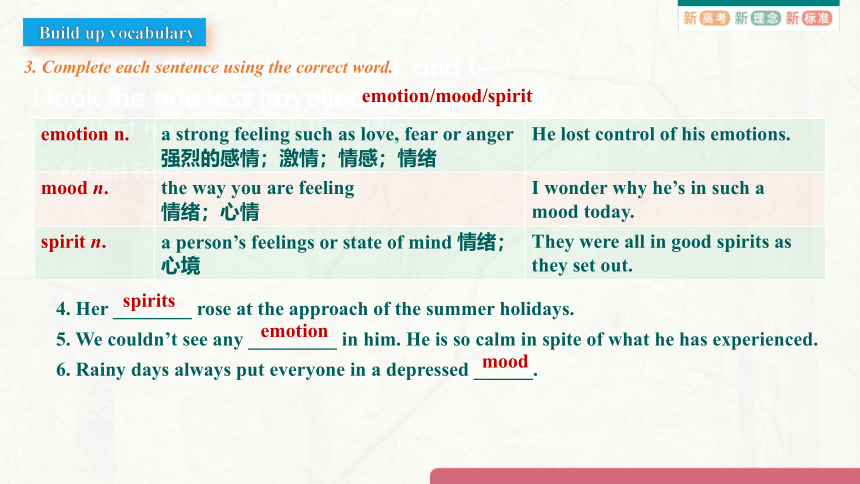
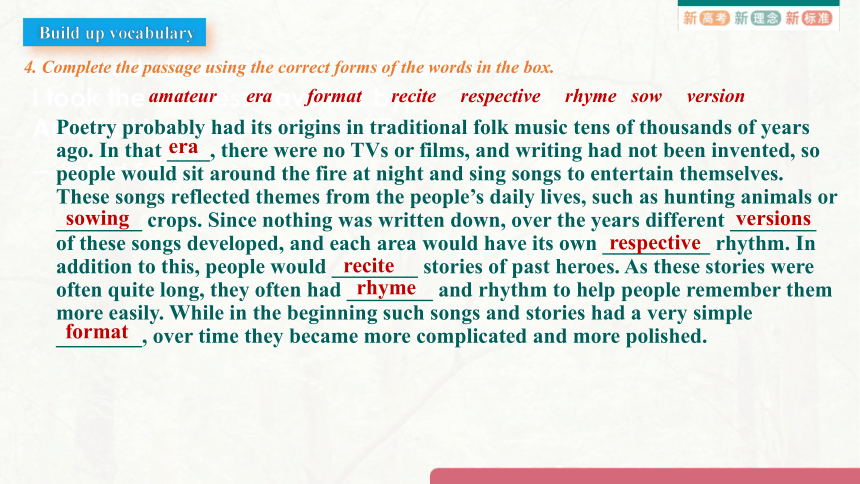
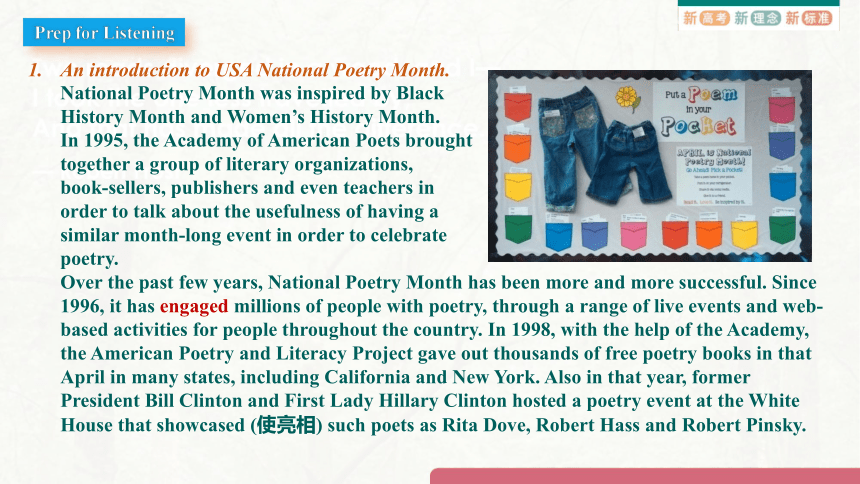
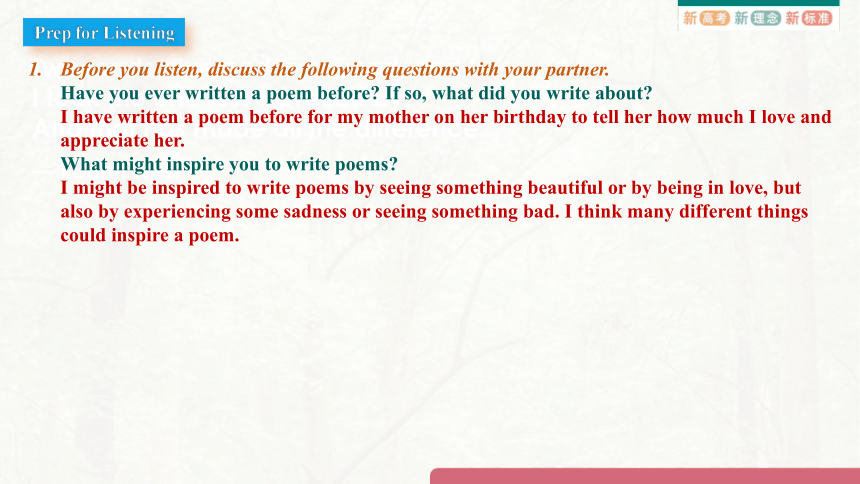
文档简介
(共58张PPT)
Unit 5
Poems
Learning about Language
& Language Points
课前准备:课本,学案。积累本,双色笔
Two roads diverged in a wood, and I —
I took the one less travelled by,
And that has made all the difference.
— Robert Frost
2019新人教版
___________________童谣
__________________由…组成
__________________樱花
__________________重要的是
__________________心情好
__________________由…构成
__________________修辞格
___________________________________有精巧的树叶图案的盘子
_____________________精致的刻花玻璃
Build up vocabulary
nursery rhyme
be made up of sth
cherry blossom
to the point
in a good mood
consist of
figures of speech
a plate with a delicate pattern of leaves
delicate hand-cut glass
______________________受欢迎
_____________________变换…为…
_____________________回头看;回忆
_____________________特别是
_____________________试一试
________________________令某人非常惊讶的是
____________________________超出某人的理解
__________________________一种完全无助的感觉
_____________________和…通信
_____________________一个举足轻重的地位
Build up vocabulary
be popular with
transform…into…
look back
in particular
give it a try/shot
to one’s utter amazement
beyond one’s comprehension
a feeling of utter helplessness
correspond with
a dominant position
1. ________ n.戏;剧;戏剧艺术→ ________adj.戏剧(性)的;突然的→ ________ adv.突然地;戏剧地;引人注目地
2. ________ n.悲伤;悲痛;伤心事vi.感到悲伤→ ________adj.悲伤的;悲哀的
3. ________n.形象的描述;意象;像→ ________ n.形象;印象
4. ________ adj.文学的;爱好文学的;有文学作品特征的→ ________n.文学
5. ________ vt.背诵;吟诵;列举→ ________n.背诵;逐一叙述
6. ___________ adv.分别;各自;依次为→ ________ adj.分别的;各自的
7. ___________ adj.同情的;有同情心的;赞同的→ ________ n.同情;赞同
8. ________ n.天真;单纯;无罪→ ________adj.天真无邪的;无辜的;无恶意的
9. ______________ n.来往信件;通信联系→ ___________vi.相一致;符合;相当于;通信
10. ________ n.变化;变体;变奏曲→ ______ vi.变化;不同→ ________adj.不同的;各种各样的→ ________n.多样性;变化
Build up vocabulary
drama
dramatic
dramatically
sorrow
sorrowful
imagery
image
literary
literature
recite
recitation
respectively
respective
sympathetic
sympathy
innocence
innocent
correspondence
correspond
variation
vary
various
variety
11. _____ adj.种族的;人种的→ _____n.竞赛;种族vi.& vt.(与…)赛跑;(与…)竞争
12. ________adj.首要的;占支配地位的;显著的→________ v.统治;支配
13. ________ n.比赛;竞赛;竞争 vt.争取赢得(比赛、选举等);争辩→_____________n.竞争者;参加竞赛者
14. ________ n.悲伤;悲痛;伤心事→________v.感到悲痛;使伤心
15. _____________adj.复杂的;难懂的→___________v.使复杂化
Build up vocabulary
racial
race
dominant
dominate
contest
contestant
grief
grieve
complicated
complicate
Build up vocabulary
1. Find the words in the poems that rhyme with the words below. Then add other words that rhyme. The first one has been done for you.
1. mockingbird word, heard
2. sad
3. sky
4. together
5. teasing
bad, glad, mad
by, fly, eye, why
weather, feather, whether
shouting, laughing, singing, running
2. Complete the passage with the correct forms of the words in the box.
delicate drama arrange compose
literary rhythm sorrow poetry
1. It seems incredible to me that the question of how best to ________ books on shelves could cause a lively online discussion.
2. The purpose of ________ criticism is to get to the core of the text and discover what message the author is attempting to convey.
3. If you need to handle a _________ situation, you should behave wisely.
4. The poet _________ quite a few poems featuring the image of cherry blossoms, and describing the joys and _________of life.
5. Blank verse is probably one of the most common and influential forms of English ________. It is so close to the natural ________ of English speech and it has no rhyming. In Shakespeare’s ________, characters from civilians to kings all speak in blank verse, but still in distinctive voices.
Build up vocabulary
arrange
literary
delicate
composed
sorrows
poetry
rhythm
dramas
3. Complete each sentence using the correct word.
recite/repeat/retell
Could you _______ what you just said
Students are required to _______ over 60 ancient poems or works of prose they have learnt from their Chinese course.
If you have finished reading the story, please try to ______ it in your own words.
Build up vocabulary
recite v. to say a poem, piece of literature, etc. that you have learned 背诵,吟诵,朗诵 Each child had to recite a poem to the class.
repeat v. to say or write sth. again 重复;重写 Can you repeat your question
retell v. to tell a story again, in a different way 复述,重新讲述 It is a tale which has often been retold within Chinese literature.
repeat
recite
retell
3. Complete each sentence using the correct word.
emotion/mood/spirit
4. Her ________ rose at the approach of the summer holidays.
5. We couldn’t see any _________ in him. He is so calm in spite of what he has experienced.
6. Rainy days always put everyone in a depressed ______.
Build up vocabulary
emotion n. a strong feeling such as love, fear or anger 强烈的感情;激情;情感;情绪 He lost control of his emotions.
mood n. the way you are feeling 情绪;心情 I wonder why he’s in such a mood today.
spirit n. a person’s feelings or state of mind 情绪;心境 They were all in good spirits as they set out.
emotion
mood
spirits
4. Complete the passage using the correct forms of the words in the box.
amateur era format recite respective rhyme sow version
Poetry probably had its origins in traditional folk music tens of thousands of years ago. In that ____, there were no TVs or films, and writing had not been invented, so people would sit around the fire at night and sing songs to entertain themselves. These songs reflected themes from the people’s daily lives, such as hunting animals or ________ crops. Since nothing was written down, over the years different ________ of these songs developed, and each area would have its own __________ rhythm. In addition to this, people would ________ stories of past heroes. As these stories were often quite long, they often had ________ and rhythm to help people remember them more easily. While in the beginning such songs and stories had a very simple ________, over time they became more complicated and more polished.
Build up vocabulary
era
sowing
respective
versions
recite
format
rhyme
An introduction to USA National Poetry Month.
National Poetry Month was inspired by Black
History Month and Women’s History Month.
In 1995, the Academy of American Poets brought
together a group of literary organizations,
book-sellers, publishers and even teachers in
order to talk about the usefulness of having a
similar month-long event in order to celebrate
poetry.
Over the past few years, National Poetry Month has been more and more successful. Since 1996, it has engaged millions of people with poetry, through a range of live events and web-based activities for people throughout the country. In 1998, with the help of the Academy, the American Poetry and Literacy Project gave out thousands of free poetry books in that April in many states, including California and New York. Also in that year, former President Bill Clinton and First Lady Hillary Clinton hosted a poetry event at the White House that showcased (使亮相) such poets as Rita Dove, Robert Hass and Robert Pinsky.
Prep for Listening
Before you listen, discuss the following questions with your partner.
Have you ever written a poem before If so, what did you write about
I have written a poem before for my mother on her birthday to tell her how much I love and appreciate her.
What might inspire you to write poems
I might be inspired to write poems by seeing something beautiful or by being in love, but also by experiencing some sadness or seeing something bad. I think many different things could inspire a poem.
Prep for Listening
Go for listening
2. You are going to listen to a conversation between a teacher and her students about a poetry contest. Listen to Part 1 and answer the questions.
1. When is the deadline for the poetry contest
The deadline for the poetry contest is 24 June.
2. What does Nora mean by saying that she needs
time to polish her writing
Nora means it’s not finished, and she needs some
time to change it and make it better.
3. Why doesn’t Pitt want to enter a poem contest
Pitt doesn’t want to enter a poem contest because
he can’t think of anything to write about.
4. What does George plan to do
George plans to write his poem on the weekend but only if he feels inspired.
Use your prior knowledge
If you come across a topic you are familiar with, you can think about what you already know about it before you listen. Using prior knowledge will make it easier for you to predict what you will hear. This will also reduce your anxiety and help you better understand the conversation while listening.
3. Listen to Part 2 and find out how the students will inspire themselves to write poetry.
Go for listening
plans to go for a hike in the countryside and sit quietly somewhere so he will notice a lot more to inspire interesting thoughts and words.
George
writes best when surrounded by familiar things and will try George’s method too
Nora
listens to music while working and writing poetry
Pitt
4. Listen to the two parts again and tick the expressions you hear that are used to praise and encourage somebody.
Praising and encouraging
Go for Talking
That’s a great idea. I like that idea.
That’s a good effort. You are doing well.
What a great idea! Your ideas sound very encouraging to me.
Keep up the good work. Do your best.
I think that’s a fantastic idea. You know what That’s a good idea.
Come on, you can do it. Give it your best shot.
5. Work in groups. Discuss entering a poem contest like the one in the listening section. The expressions in Activity 4 and the following questions may help you.
1. What kind of poem are you going to write
I am going to write haiku.
2. What are the topics you would love to write about
I would like to write about nature and wildlife.
3. How will you inspire yourself to write the poem
I will inspire myself to write the poem by visiting an ancient temple and forest in the countryside.
4. Will you use rhyming words in your poem Why
I won’t use rhyming words in my poem as haiku doesn’t usually have rhyming words.
Go for Talking
4. Connect the sentences using relative pronouns or adverbs.
1. The Crescent Moon is perhaps the most famous collection of children’s poems. It is known to people in China.
The Crescent Moon is perhaps the most famous collection of children’s poems that is known to people in China.
2. There are also many poems written from a child’s perspective. In these poems the poet Tagore shows a sympathetic understanding of children’s feelings.
There are also many poems written from a child’s perspective in which the poet Tagore shows a sympathetic understanding of children’s feelings.
3. The English version of the book contains nearly 50 poems. The focus of the poems is on the parent-child relationship.
The English version of the book contains nearly 50 poems, the focus of which is on the parent-child relationship.
Go for Grammar
4. Connect the sentences using relative pronouns or adverbs.
4. The initial poems were written from the perspective of a mother. The mother loves her baby at play and at rest, in laughter and in tears.
The initial poems were written from the perspective of a mother who loves her baby at play and at rest, in laughter and in tears.
5. Many people love to read this collection of poems. The reason is that they can feel the warmth of love and enjoy the innocence of childhood.
The reason why many people love to read this collection of poems is that they can feel the warmth of love and enjoy the innocence of childhood.
6. It was written by the Indian poet Tagore. Tagore was the first Asian to win the Nobel Prize in Literature.
It was written by the Indian poet Tagore who was the first Asian to win the Nobel Prize in Literature.
Go for Grammar
4. Put the sentences in the correct order to compose a passage.
The Crescent Moon is perhaps the most famous collection of children’s poems that is known to people in China.
There are also many poems written from a child’s perspective in which the poet Tagore shows a sympathetic understanding of children’s feelings.
The English version of the book contains nearly 50 poems, the focus of which is on the parent-child relationship.
The initial poems were written from the perspective of a mother who loves her baby at play and at rest, in laughter and in tears.
The reason why many people love to read this collection of poems is that they can feel the warmth of love and enjoy the innocence of childhood.
It was written by the Indian poet Tagore who was the first Asian to win the Nobel Prize in Literature.
Go for Grammar
4. Put the sentences in the correct order to compose a passage.
The Crescent Moon is perhaps the most famous collection of children’s poems that is known to people in China.
There are also many poems written from a child’s perspective in which the poet Tagore shows a sympathetic understanding of children’s feelings.
The English version of the book contains nearly 50 poems, the focus of which is on the parent-child relationship.
The initial poems were written from the perspective of a mother who loves her baby at play and at rest, in laughter and in tears.
The reason why many people love to read this collection of poems is that they can feel the warmth of love and enjoy the innocence of childhood.
It was written by the Indian poet Tagore who was the first Asian to win the Nobel Prize in Literature.
Go for Grammar
定语从句的基本用法
The structure of restrictive relative clauses
定义: 在复合句中, 修饰名词或代词的从句叫定语从句。
Two thirds of the people who lived there were dead or injured.
先行词
关系词
从句
关系代词
关系副词
which, who, whom, whose, that, as
where, when why
The attributive clause
关系代词 指代 从句中的成分
that 人/物 主语/宾语/表语
which 物 主语/宾语/表语
who 人 主语/宾语/表语
whom 人 宾语
whose 人/物 定语
The attributive clause
关系代词有三个作用:
1)连接作用:引导从句,把从句和它所修饰的内容连接起来;
2)替代作用:在从句中替代被从句所修饰的先行词;
3)在从句中充当成分:作主语、宾语、表语、定语。
判断定语从句的关系代词的方法:
如果名词或代词后有一个句子,并且该名词或代词在句子中充当成分,则该句子就是定语从句。
主要按照以下三步来判断:
1.找准先行词(定语从句前的名词或代词)。
2.把先行词还原到定语从句中,看充当什么成分。
3.根据先行词在定语从句中所充当的成分以及句意来选用适当的引导词。
关系代词 指代范围 在从句中所作成分 例句
who 人 主语、宾语 And then,how many adults,who now complain (抱怨) about the long drives to work,eagerly drove for hours at a time when they first obtained their driver’s licenses(执照)?
whom 人 宾语 Four days later Ann was still looking after the dog,whom they had started to call Riley.
that 人或 物 主语、宾语、表语(不引导非限制性定语从句) ①A plane is a machine that can fly.
②I don’t know the man (that) you mentioned.
which 物 主语、宾语 Over the years,I’ve learned to iron shirts skillfully,which gives me a sense of pride.
whose 人或 物 定语 ①Do you know the boy whose father (the father of whom/of whom the father) is an engineer
②He lives in a house whose windows(the windows of which/of which the windows) face south.
一、关系代词的基本用法
二、只用that,which的情况
情况 用法说明 例句
只用 that 的 情况 (1)先行词为all,everything,anything,nothing,little,much等不定代词时; (2)先行词被all,any,every,each,much,little,no,some,few等修饰时; (3)先行词由形容词最高级和序数词修饰时; (4)先行词既指人又指物时; (5)先行词被the only,the very修饰时。 (6)当主句的主语是疑问词who或which时。 ①He told me everything that he knows.
②All the books that you offered have been given out.
③This is the best film that I have ever seen.
④We talked about the persons and things that we remembered.
⑤He is the only man that I want to see.
⑥Who is the man that is making a speech?
只用 which 的情况 在非限制性定语从句中,只用which。 My cousin Tina serves as a translator,which is quite popular in some foreign business firms.
三、关系副词引导的定语从句
关系副词 指代范围 在从句中所作成分 例句
when(=at/ on/in/during which) 时间 时间状语 We live in an age when more information is available with greater ease than ever before.
where= (at/in which) 地点 地点状语 When I arrived,Bryan took me to see the house where I would be staying.
why=(for which) 原因 原因状语 I don’t know the reason why(=for which)he was late.
温馨提示 (1)the way作先行词,当它在从句中充当方式状语时,其后的关系词可以是in which,that或省略; (2)当它在从句中充当主语、宾语等成分时,其后的关系词就用that或which。 The way(that/in which) he explained the sentence to us was not difficult to understand.(状语)
比较:The way (that/which)he explained to us was quite simple.(宾语)
当先行词是situation,stage, process,activity,case,condition等,且关系词在从句中作状语时,要用关系副词where,作主语、宾语用which或that。 A house bubble is an economic situation which occurs when house prices rise much too fast.
The museum will open in the spring with an exhibition and a viewing platform where visitors can watch the big glasshouses being built.
先行词为occasions,当“时机”讲时,用关系副词when;当“场合”讲时,用关系副词where。 Occasions are quite rare when I have the time to spend a day with my kids.
四、特殊的先行词的特殊引导词
定语从句 区别 例句
as引 导限 制性 定语 从句 (1)“the same...that” that修饰的名词与原物是同一个; (2)“the same...as...”as修饰的是与先行词同类型的一个东西。 This is the same bag that I lost yesterday.
(同一个书包)
This is the same bag as I lost yesterday.(同类型的另一个)
as引 导限 制性 定语 从句 such/so...as...”和“such/so...that...” 结构不同,as引导定语从句,而that引导状语从句 They talked in such simple English as children could understand.(定语从句)
They talked in such simple English that children could understand it.(状语从句)
五、as引导词的用法
as 引导 非限 制性 定语 从句 (1)as引导非限制性定语从句,通常先行词为整个句子,意为“正如……,正像……”。as引导的从句既可以放在主句前,也可以放在主句后,有时还要插入主句中。as常用于下列习惯用语中: as we had expected 正如我们所预料的那样 as often happens 正如经常发生的那样 as has been said before正如以前所说的那样 as is mentioned above正如上面提到的 as is often the case 情况往往是这样 (2)which引导非限制性定语从句修饰前面整个句子时,常译为“这一点,这件事”等。which从句只能位于被修饰句子的后面。 ①The air quality in the city,as is shown in the report,has improved over the past two months.
正如报告所显示的,在过去的两个月里,这个城市的空气质量已有所改善。
②They won the game,as we had expected.
正如我们所预料的一样,他们赢得了比赛。
③The weather turned out to be very good,which was more than we could expect.
结果天气很好,这超出了我们的想象。
五、as引导词的用法
分隔式定语从句 先行词与关系词分隔
插入式定语从句 关系代词与定语从句之间有插入语
省略式定语从句 介词+关系代词+不定式
介词+关系副词 from where/since when也可引导定语从句
①The days are gone when physical strength was all you needed to make a living. 体力是你赖以生存的唯一手段的日子一去不复返了。 ②To own a computer in families, which we thought was impossible twenty years ago, now becomes true. 家里有台电脑,在20年前我们认为这是不可能的事,现在实现了。 ③We stood at the top of the hill,from where we can see the town. 我们站在山顶上能看到全镇的景色。 ④The poor man has no house in which to live. =The poor man has no house(that/which) he can live in. 这个可怜的人没有房子住。
六、特殊定语从句
【温馨提示】 在英语中,有许多从句,如主语从句、同位语从句以及强调句型与定语从句有许多相似之处。因此,命题人会利用这些相似性,设置一个特定语境,来考查考生对这些易混点的辨析能力。遇到这样的问题,我们的思路就是,抓住它们各自的特征,结合语境去判断到底属于何种句型或从句。
①I have three cars,none of which is in good condition.(定语从句)
②I have three cars,but none of them is in good condition.(并列句)
③The suggestion (that) he came up with is practical.(定语从句,that在从句中充当宾语可省略)
④He gave me a suggestion that we should read aloud every morning.(同位语从句,that在从句中不作成分,但不可省略)
七、特殊从句区分与辨认
八.关系代词易错点
1.关系代词的省略
Hangzhou is a beautiful city(that/which)I always want to visit.
(在限制性定语从句中作visit的宾语,可以省略)
Hangzhou ,which I visited last week, is a beautiful city.
(在非限制性定语从句中作visited的宾语,不可省略)
2.从句中代词的重复多余
The book that I read it yesterday is very interesting.(×)
The book that I read yesterday is very interesting.(√)
3.what不引导定语从句
All that we need is a supply of oil. (that引导定语从句,修饰先行词all)
What we need is a supply of oil. (what引导主语从句) 我们需要的是石油供应。
4.that不引导非限制性定语从句(用逗号隔开)
The basketball star, who tried to make a comeback, attracted lots of attention.
He has become a doctor, which he wanted to be.
5.whose+n= the+n+of which=of which+the+n.名词前必须有the
I live in the room whose window/the window of which / of which the window faces south.我住在窗子朝南开的房间里。
6.关系代词前有介词时 (介词提前) .指人只用whom, 指物只用which
This is the boy with whom he talked.
This is the ring on which she spent 1000 dollars.
八.关系代词易错点
7. 定语从句中的主谓一致: 关系代词在定语从句中做主语时, 从句谓语通常与先行词在人称和数上保持一致。
one of +复数名词”谓语动词用复数形式;
the (only/very)one of +复数名词” 谓语动词用单数形式。
He is a good student who likes to help others.
They are good students who like to help others.
He is one of the students who were praised.
他是一个受到表扬的学生之一。
He is the one/ the only one of the students who was praised.
他是唯一一个受到表扬的学生。
八.关系代词易错点
九关系副词易错点
1.where指代抽象地点,意为“在…… 中(下)” where既可以指代具体的地点名词,也可指代抽象地点名词,常见的抽象地点名词: situation, condition, scene, stage, position, case, point等。 I have reached a point in my life where I should make decisions of my own.
Nowadays people are more concerned about the environment where they live.
Life is like a long race where we compete with others to go beyond ourselves.
2.when指代抽象时间,意思为“在 ……的时间里” when既可以指代具体的时间名词,也可指代抽象时间名词,常见的有occasion(时机), time, age, period等。 Occasions are quite rare when I have the time to spend a day with my kids.
We are living in an age when many things are done on computers.
3.why不能引导非限制性定语从句,要用for which。 I have told him the reason, for which I missed the early bus.
4.Way 作先行词 ①way充当方式状语,引导词用 that 或in which ,也可省略。(注意how不能引导定语从句。) ②充当主语、宾语,引导词用 that 或which,做主语时不可省略,做宾语时可省略。 This is the way (that/in which) he solved the problem.
(先行词the way还原到定语从句中为:he solved the problem in the way,作方式状语,引导词用 that 或in which,也可省略。)
This is the way (that/which) he used to solve the problem.
(the way作used的宾语,that/which可省略)
This is the way that/which was used to solve the problem.
(the way作was used的主语,that/which不可省略)
九关系副词易错点
5.”介词+关系代词”引导的定语从句 A.若先行词指人,关系代词whom;若先行词指物,关系代词用 which。 It was in 1952 and Mandela was the black lawyer to whom I went for advice.那是在1952年,曼德拉是我寻求建议的那位黑人律师。
I’ll never forget the day on which(=when) first met Lucy.
This is the town in which(=where)Shakespeare was born.
I’d like you to explain the reason for which(=why) you were absent.
B.关系代词前介词的选择。 将先行词还原到定语从句中,即可确定介词。 (1)I can’t remember the age at which he won the prize.
(at the age)
(2)The documents for which they were searching have been recovered.(search for)
(3)The colorless gas without which we cannot live is called oxygen
C.介词可以后移,此时关系代词可以省略(省略时,介词必须后移) This is the book for which you asked. =This is the book which/that you asked for.
注意 一些与动词搭配的介词可以提到关系代词之前构成“介词+关系代词”结构,但有些含有介词的动词短语一般不能拆开,如 look for, look after, call on, care for, hear of, take care of等。
我必须要照顾的最小的妹妹非常可爱。
【正】My youngest sister, whom have to look after, is very lovely.
【误】My youngest sister, after whom have to look, is very lovely.
九关系副词易错点
定语从句和它所修饰的先行词中间插入谓语、状语或另外的定语等成分或者插入语把引导词与定语从句分割。理解句子时,注意找准先行词。 A new teacher will come tomorrow who will teach us English.
The days are gone when physical strength was what you needed to make a living.
I walked up to the top of the hill with my friend, where we enjoyed a splendid view of the lake.
The scientist has made another discovery, which , of course, is of great importance.
九关系副词易错点
1.Is this factory the one (that )you visited yesterday
Is this the factory (that/ which) you visited yesterday
2.The old man has three sons, one of whom is a teacher.
The old man has three sons, and one of them is a teacher.
3.The news (that/ which) he told us is true.
The news that our team won the game is true.
4.The doctor did all (that) he could to save the boy.
The doctor did what he could to save the boy.
5.As is known to the world, Mark Twain was a famous writer.
It is known to the world that Mark Twain was a famous writer.
What is known to the world is that Mark Twain was a famous writer.
十易混淆从句对比
6.You should leave things at the place where you can find them again easily.
You should leave things where you can find them again easily.
7.It was in this place that he was born.
This is the place where he was born.
It was in the factory where he worked that we met each other together.
8.He is such a good teacher /so good a teacher as we all like.
He is such a good teacher /so good a teacher that we all like him.
9.This is the first time (that) I have come to Beijing
There was a time when I didn’t like English.
10.The reason why he didn’t come yesterday is that he was ill.
十易混淆从句对比
用正确的关系代词填空
1.She never gives in to those ________ have money.
2.This is the best film ______ has been shown so far in the city.
3.February is the only month ________ has fewer than 30 days.
4.My son made notes of everything ________ he read.
5.Will you show me the girl ________ name is Wei Fang
6.Please pass me the book ___________is lying on the table.
7.My grandparents like stories ________ endings are happy.
8.Yuan Longping is a Chinese rice scientist __________ is leading a search to develop “sea rice”.
9.The teacher ____________________I like best often encourages me to fight for my dream.
10.Jack likes being with the classmates __________are outgoing and kind.
11.A kind of shared bike _____________is called bluegogo is getting more and more popular in Chengdu.
who
that
that
that
whose
which/that
whose
who/that
who/whom/that
who/that
that/which
牛刀小试
Tu Youyou is the woman _______ used the plant’s special power to save millions of lives.
His parents wouldn't let him marry anyone _______ family was poor.
It is the third time that she has won the race, ______ has surprised us all.
Can you remember the scientist and his theory _____ we have learned
Until now, we have raised 50, 000 pounds for the poor children, ____ is quite unexpected.
Yesterday Mr. Green went to his hometown and visited the old house in ______ he was born.
The man, from______ I learned the news, is an engineer.
— Do you like the weekly talk show The Readers on CCTV
— Sure.It’ s a great TV program ______ purpose is to bring the habit of reading back into the public.
Children ______ diet is high in fat will gain weight quickly.
After graduating from college, I took some time off to go travelling, _____ turned out a wise decision
who/that
whose
which
that
which
which
whom
whose
whose
which
牛刀小试
1.We visited the house _____ the famous scientist once lived.
2.The photo reminded me of the days ________ I played hide-and-seek with my brother
and I stayed for six years.
3.It was a period _____ they had discussion very frequently.
4.The problem has come to a point ________ everyone has different opinions and it is
difficult to reach an agreement.
6.One of the reasons ______ he was refused in the interview was that his spoken English was
terrible.
7.I'll never forget the time _____________ we spent together in the volunteer organization.
8.I'll never forget the day ________ I joined the robot club.
9.Miss Smith is an excellent teacher ________ whom I have learned a lot.
10.They have two children, both of ________ work in large companies.
where
when
when
where
why
that/which
when
from
whom
牛刀小试
关系副词填空
1. Do you still remember the first day ______ you went to high school
2. I paid a visit to Fudan University _______ my father studied thirty years ago.
3. Do you know the real reason ______ Anne didn't go to the get-together
4. Tomorrow I will bring here the magazine for _______ you asked.
5. Peter put himself in a situation _______ he had to leave the company.
6. There was a time ______ my daughter was crazy about pop music.
7. The restaurant _______ I have eaten a wonderful meal is going to close down.
8. There are two main reasons ______ this situation has been allowed to continue.
用介词 + 关系代词填空。
1. Who is the person _______ _______ you just shook hands
2. China is a powerful country, _______ _______ we are proud.
3. This is the tree _______ _______ we used to play games.
4. This is my glasses, _______ _______ I can’t see clearly.
5. Do you remember the day _______ _______ you joined our club
6. Do you know the reason _____ _______ he lost the job
when
where
why
which
where
when
where
why
with whom
without which
under which
of which
on which
for which
牛刀小试
As,Which 与 Whom
(1)Maria has written two novels,both of___________ have been made into television series.
(2)The air quality in the city,__________is shown in the report,has declined over the past two months.
(3)A lot of language learning,__________ has been discovered,is happening in the first year of life,so parents should talk much to their children during that period.
(4)In our class there are 46 students,__________ whom half wear glasses.
(5)It is the third time that she has won the race,__________ has surprised us all.
(6)That evening,I ended up working very late,________ I will tell you more about later.
(7)I wish to thank Professor Smith,without _______ help I would never have got this far.
(8)The prize will go to the writer __________ story shows the most vivid imagination.
牛刀小试
which
as
as
of
which
which
whose
whose
根据汉义用定语从句补全句子
1. There are many reasons________________________________.(人们学习一门外语的)
2. He couldn't remember the place______________________(他藏钱的).
3. Are you the person_________________________(他们正在寻找的).
4. For the young people ____________________________(想出国学习的)our
school is a good choice.
5. The days___________________________________(中国人被人看不起的) are gone.
6. After living in Paris for fifty years, he returned to the small town
________________ (他长大的)as a child.
7. This is the reason ______________________________.(他开会迟到的)
why people learn a foreign language
where he hid the money
whom they are looking for
who want to go abroad to study
when Chinese were looked down upon
where he grew up
why he was late for the meeting
牛刀小试
词汇精讲
1. core n. 核心;精髓;(水果的)核儿
【原文回顾】Concern for the environment is at the corn of our policies.
core of the apple苹果核
the earth’s core 地核
the core of the argument 争论的核心
to the core直至核心;十足;透顶
完成句子
(1)The ______________jujubes are too hard to digest. 枣子核太硬,不能消化。
(2)She is ________________ . 她是这个队的核心成员。
(3)He’s a politician ___________. 他是个十足的政客。
cores of
the core of the team
to the core
词汇精讲
2. blank adj. & n.
【原文回顾】p.52 Blank verse is probably one of the most common and influential forms of English poetry. 无韵诗可能是最常见和最有影响的英语诗歌形式之一。
(1)adj. 空白的;无图画(或韵律、装饰)的;没表情的
【搭配】:
go blank(脑子里)突然一片空白;出现空白(指没有图像、文字等)
a blank look/expression 毫无表情的眼神 / 木然的表情
Hearing the news,my mind went blank
Jim was watching a late night film at home when,right in the middle of a thrilling scene,the television went blank.
(2)n.(记忆中的)空白;(文件等的)空格
I am trying to think of his name,but my mind is a complete blank.
fill in the blanks 填空
blankly adv. 茫然地
词汇精讲
2. blank adj. & n.
【易混辨析】empty, vacant, hollow, bare与blank “空白”
1) empty “空的”,指某物缺少其常有的东西。引申为“空洞的,空虚的;说话不算数的”。
an empty car/ box/ room/promise/ life empty words
2) vacant “空着的;未被占用的”,常指房子、座位、职位等。
The room is vacant.
3) hollow “中空的;空心的”,与solid相对。
A water pipe is hollow.
4) bare “(房间、柜子等)空的;裸露的;无遮盖的”。
a bare room/bare arm/bare walls
5) blank 表面没有任何东西或表面是空白的,引申为“没表情的”。
a blank wall, a blank expression
词汇精讲
【语法填空】
(1)I stared (blank) at the paper in front of me.
【完成句子】
(2)Steve (看起来很茫然)and said he had no idea what I was talking about.
(3)Before getting into the car,I thought I had learned the instructor’s orders,but once I started the car,my mind ___________(一片空白).
(4)Use the information to (填空) on your form.
(5)She stared at me (木然地)on her face.
blankly
looked blank
went blank
fill in the blanks
with a blank look/expression
词汇精讲
3. sympathetic adj. 同情的;有同情心的;赞同的
教材原句p.53 In these poems the poet Tagore shows a sympathetic understanding of children’s feelings. 在这些诗中,诗人泰戈尔对孩子们的感情表现出同情的理解。
I did not feel sympathetic towards Kate at all.
Russian newspapers are largely sympathetic to the president.
I’m here if you need a sympathetic ear.
I have a lot of sympathy for her;she brought up the children on her own.
【词语积累】
sympathy n. 同情;支持;赞同
express/offer sympathy 表达同情
out of sympathy 出于同情
in sympathy with 支持
have sympathy with 支持
be sympathetic towards/to 对……同情;
be sympathetic towards/to 赞同;支持;
a sympathetic ear 乐于倾听别人的困难
have(no) sympathy for 对……(不)同情
词汇精讲
(1)She was very (sympathy) to the problems of adult students.
(2)The railway workers came out in sympathy the miners.
完成句子
(3)We (同情)the flood sufferers.
(4)I (不同情)Jane. It’s all her own fault.
(5)I (赞同)this point of view.
sympathetic
with
are sympathetic towards/to 或have sympathy for
have no sympathy for
am in sympathy with 或 am sympathetic to/towards
词汇精讲
4. innocence n. 天真;单纯;无罪
【原文回顾】p.53 The reason is that they can feel the warmth of love and enjoy the innocence of childhood. 原因是他们能感受到爱的温暖,享受到童年的纯真。
Children lose their innocence as they grow older.
This new evidence will prove their innocence.
He claims he has evidence which can prove his innocence
【词语积累】
innocent adj. 天真无邪的;无辜的;无恶意的
They seemed so young and innocent.
He was sure that the reliable man was innocent of any crime.
单词拼写
(1)He was led away, protesting his (无罪).
(2)He firmly believes that she is (无罪的) of the crime.
完成句子
(3)The prisoners continued to (申明他们无罪).
innocence
innocent
protest their innocence
词汇精讲
5. correspondence n. 来往信件;通信联系
【教材原句】p.53 Browning fell in love with her poetry and then they entered into personal correspondence. 布朗宁爱上了她的诗,然后他们开始私下通信。
enter into correspondence with sb. 与某人通信
personal/private correspondence 私人来往信件
the correspondence column/page 读者来信专栏
correspondent/reporter/
【佳句】
The editor welcomes correspondence from readers on any subject.
I refused to enter into any correspondence with him about it.
【词语积累】
correspond v. 通信;相当于;符合;相一致
correspond to/with 与……相一致;符合
correspond to 相当于
correspond with 与……通信
The American Congress corresponds to the British Parliament.
词汇精讲
【语法填空】
(1)We have been in (correspond)for months.
(2)Her correspondence Jim lasted many years.
【完成句子】
(1)A secretary came in twice a week to ___________________ (处理他的信件).
(2)She stopped (与她父亲通信)after the death of her mother.
(3)At that time I (开始和她通信).
correspondence
with
deal with his correspondence
corresponding with her father
entered into correspondence with her
词汇精讲
6.句型公式:动词不定式(短语)作后置定语
【原文回顾】 Tagore was the first Asian to win the Nobel Prize in Literature.
泰戈尔是第一个获得诺贝尔文学奖的亚洲人。
【用法】
常用动词不定式(短语)作后置定语的情况:
(1)被修饰词为序数词、形容词最高级或被序数词、形容词最高级修饰时。
(2)不定代词something、 nothing、 little等后常用动词不定式作定语。
(3)抽象名词way、 chance、 ability、 courage、 opportunity、 wish等后常用动词不定式作定语。
(4)被修饰词前有the only、 the very、 the next等词对其进行修饰时。
【品悟】 If you could take my application into consideration, I would cherish the precious opportunity to be a volunteer. 如果您能考虑我的申请,我将珍惜这次成为一名志愿者的宝贵机会。
词汇精讲
【练透】 单句语法填空
①You are the only person ___________(go) abroad for further study in our company.
②Will you attend the meeting _______________(hold) tomorrow?
【写美】 完成句子
③Thank you for giving me ___________________________ .
谢谢你给我这次发表演讲的机会。
④It is ________________________________ , not where you come from or what you are.
重要的是你完成工作的能力,而不是你来自哪里或你是干什么的。
to go
to be held
the chance to make a speech
your ability to do the job that matters
感谢您的观看
Unit 5
Poems
Learning about Language
& Language Points
课前准备:课本,学案。积累本,双色笔
Two roads diverged in a wood, and I —
I took the one less travelled by,
And that has made all the difference.
— Robert Frost
2019新人教版
___________________童谣
__________________由…组成
__________________樱花
__________________重要的是
__________________心情好
__________________由…构成
__________________修辞格
___________________________________有精巧的树叶图案的盘子
_____________________精致的刻花玻璃
Build up vocabulary
nursery rhyme
be made up of sth
cherry blossom
to the point
in a good mood
consist of
figures of speech
a plate with a delicate pattern of leaves
delicate hand-cut glass
______________________受欢迎
_____________________变换…为…
_____________________回头看;回忆
_____________________特别是
_____________________试一试
________________________令某人非常惊讶的是
____________________________超出某人的理解
__________________________一种完全无助的感觉
_____________________和…通信
_____________________一个举足轻重的地位
Build up vocabulary
be popular with
transform…into…
look back
in particular
give it a try/shot
to one’s utter amazement
beyond one’s comprehension
a feeling of utter helplessness
correspond with
a dominant position
1. ________ n.戏;剧;戏剧艺术→ ________adj.戏剧(性)的;突然的→ ________ adv.突然地;戏剧地;引人注目地
2. ________ n.悲伤;悲痛;伤心事vi.感到悲伤→ ________adj.悲伤的;悲哀的
3. ________n.形象的描述;意象;像→ ________ n.形象;印象
4. ________ adj.文学的;爱好文学的;有文学作品特征的→ ________n.文学
5. ________ vt.背诵;吟诵;列举→ ________n.背诵;逐一叙述
6. ___________ adv.分别;各自;依次为→ ________ adj.分别的;各自的
7. ___________ adj.同情的;有同情心的;赞同的→ ________ n.同情;赞同
8. ________ n.天真;单纯;无罪→ ________adj.天真无邪的;无辜的;无恶意的
9. ______________ n.来往信件;通信联系→ ___________vi.相一致;符合;相当于;通信
10. ________ n.变化;变体;变奏曲→ ______ vi.变化;不同→ ________adj.不同的;各种各样的→ ________n.多样性;变化
Build up vocabulary
drama
dramatic
dramatically
sorrow
sorrowful
imagery
image
literary
literature
recite
recitation
respectively
respective
sympathetic
sympathy
innocence
innocent
correspondence
correspond
variation
vary
various
variety
11. _____ adj.种族的;人种的→ _____n.竞赛;种族vi.& vt.(与…)赛跑;(与…)竞争
12. ________adj.首要的;占支配地位的;显著的→________ v.统治;支配
13. ________ n.比赛;竞赛;竞争 vt.争取赢得(比赛、选举等);争辩→_____________n.竞争者;参加竞赛者
14. ________ n.悲伤;悲痛;伤心事→________v.感到悲痛;使伤心
15. _____________adj.复杂的;难懂的→___________v.使复杂化
Build up vocabulary
racial
race
dominant
dominate
contest
contestant
grief
grieve
complicated
complicate
Build up vocabulary
1. Find the words in the poems that rhyme with the words below. Then add other words that rhyme. The first one has been done for you.
1. mockingbird word, heard
2. sad
3. sky
4. together
5. teasing
bad, glad, mad
by, fly, eye, why
weather, feather, whether
shouting, laughing, singing, running
2. Complete the passage with the correct forms of the words in the box.
delicate drama arrange compose
literary rhythm sorrow poetry
1. It seems incredible to me that the question of how best to ________ books on shelves could cause a lively online discussion.
2. The purpose of ________ criticism is to get to the core of the text and discover what message the author is attempting to convey.
3. If you need to handle a _________ situation, you should behave wisely.
4. The poet _________ quite a few poems featuring the image of cherry blossoms, and describing the joys and _________of life.
5. Blank verse is probably one of the most common and influential forms of English ________. It is so close to the natural ________ of English speech and it has no rhyming. In Shakespeare’s ________, characters from civilians to kings all speak in blank verse, but still in distinctive voices.
Build up vocabulary
arrange
literary
delicate
composed
sorrows
poetry
rhythm
dramas
3. Complete each sentence using the correct word.
recite/repeat/retell
Could you _______ what you just said
Students are required to _______ over 60 ancient poems or works of prose they have learnt from their Chinese course.
If you have finished reading the story, please try to ______ it in your own words.
Build up vocabulary
recite v. to say a poem, piece of literature, etc. that you have learned 背诵,吟诵,朗诵 Each child had to recite a poem to the class.
repeat v. to say or write sth. again 重复;重写 Can you repeat your question
retell v. to tell a story again, in a different way 复述,重新讲述 It is a tale which has often been retold within Chinese literature.
repeat
recite
retell
3. Complete each sentence using the correct word.
emotion/mood/spirit
4. Her ________ rose at the approach of the summer holidays.
5. We couldn’t see any _________ in him. He is so calm in spite of what he has experienced.
6. Rainy days always put everyone in a depressed ______.
Build up vocabulary
emotion n. a strong feeling such as love, fear or anger 强烈的感情;激情;情感;情绪 He lost control of his emotions.
mood n. the way you are feeling 情绪;心情 I wonder why he’s in such a mood today.
spirit n. a person’s feelings or state of mind 情绪;心境 They were all in good spirits as they set out.
emotion
mood
spirits
4. Complete the passage using the correct forms of the words in the box.
amateur era format recite respective rhyme sow version
Poetry probably had its origins in traditional folk music tens of thousands of years ago. In that ____, there were no TVs or films, and writing had not been invented, so people would sit around the fire at night and sing songs to entertain themselves. These songs reflected themes from the people’s daily lives, such as hunting animals or ________ crops. Since nothing was written down, over the years different ________ of these songs developed, and each area would have its own __________ rhythm. In addition to this, people would ________ stories of past heroes. As these stories were often quite long, they often had ________ and rhythm to help people remember them more easily. While in the beginning such songs and stories had a very simple ________, over time they became more complicated and more polished.
Build up vocabulary
era
sowing
respective
versions
recite
format
rhyme
An introduction to USA National Poetry Month.
National Poetry Month was inspired by Black
History Month and Women’s History Month.
In 1995, the Academy of American Poets brought
together a group of literary organizations,
book-sellers, publishers and even teachers in
order to talk about the usefulness of having a
similar month-long event in order to celebrate
poetry.
Over the past few years, National Poetry Month has been more and more successful. Since 1996, it has engaged millions of people with poetry, through a range of live events and web-based activities for people throughout the country. In 1998, with the help of the Academy, the American Poetry and Literacy Project gave out thousands of free poetry books in that April in many states, including California and New York. Also in that year, former President Bill Clinton and First Lady Hillary Clinton hosted a poetry event at the White House that showcased (使亮相) such poets as Rita Dove, Robert Hass and Robert Pinsky.
Prep for Listening
Before you listen, discuss the following questions with your partner.
Have you ever written a poem before If so, what did you write about
I have written a poem before for my mother on her birthday to tell her how much I love and appreciate her.
What might inspire you to write poems
I might be inspired to write poems by seeing something beautiful or by being in love, but also by experiencing some sadness or seeing something bad. I think many different things could inspire a poem.
Prep for Listening
Go for listening
2. You are going to listen to a conversation between a teacher and her students about a poetry contest. Listen to Part 1 and answer the questions.
1. When is the deadline for the poetry contest
The deadline for the poetry contest is 24 June.
2. What does Nora mean by saying that she needs
time to polish her writing
Nora means it’s not finished, and she needs some
time to change it and make it better.
3. Why doesn’t Pitt want to enter a poem contest
Pitt doesn’t want to enter a poem contest because
he can’t think of anything to write about.
4. What does George plan to do
George plans to write his poem on the weekend but only if he feels inspired.
Use your prior knowledge
If you come across a topic you are familiar with, you can think about what you already know about it before you listen. Using prior knowledge will make it easier for you to predict what you will hear. This will also reduce your anxiety and help you better understand the conversation while listening.
3. Listen to Part 2 and find out how the students will inspire themselves to write poetry.
Go for listening
plans to go for a hike in the countryside and sit quietly somewhere so he will notice a lot more to inspire interesting thoughts and words.
George
writes best when surrounded by familiar things and will try George’s method too
Nora
listens to music while working and writing poetry
Pitt
4. Listen to the two parts again and tick the expressions you hear that are used to praise and encourage somebody.
Praising and encouraging
Go for Talking
That’s a great idea. I like that idea.
That’s a good effort. You are doing well.
What a great idea! Your ideas sound very encouraging to me.
Keep up the good work. Do your best.
I think that’s a fantastic idea. You know what That’s a good idea.
Come on, you can do it. Give it your best shot.
5. Work in groups. Discuss entering a poem contest like the one in the listening section. The expressions in Activity 4 and the following questions may help you.
1. What kind of poem are you going to write
I am going to write haiku.
2. What are the topics you would love to write about
I would like to write about nature and wildlife.
3. How will you inspire yourself to write the poem
I will inspire myself to write the poem by visiting an ancient temple and forest in the countryside.
4. Will you use rhyming words in your poem Why
I won’t use rhyming words in my poem as haiku doesn’t usually have rhyming words.
Go for Talking
4. Connect the sentences using relative pronouns or adverbs.
1. The Crescent Moon is perhaps the most famous collection of children’s poems. It is known to people in China.
The Crescent Moon is perhaps the most famous collection of children’s poems that is known to people in China.
2. There are also many poems written from a child’s perspective. In these poems the poet Tagore shows a sympathetic understanding of children’s feelings.
There are also many poems written from a child’s perspective in which the poet Tagore shows a sympathetic understanding of children’s feelings.
3. The English version of the book contains nearly 50 poems. The focus of the poems is on the parent-child relationship.
The English version of the book contains nearly 50 poems, the focus of which is on the parent-child relationship.
Go for Grammar
4. Connect the sentences using relative pronouns or adverbs.
4. The initial poems were written from the perspective of a mother. The mother loves her baby at play and at rest, in laughter and in tears.
The initial poems were written from the perspective of a mother who loves her baby at play and at rest, in laughter and in tears.
5. Many people love to read this collection of poems. The reason is that they can feel the warmth of love and enjoy the innocence of childhood.
The reason why many people love to read this collection of poems is that they can feel the warmth of love and enjoy the innocence of childhood.
6. It was written by the Indian poet Tagore. Tagore was the first Asian to win the Nobel Prize in Literature.
It was written by the Indian poet Tagore who was the first Asian to win the Nobel Prize in Literature.
Go for Grammar
4. Put the sentences in the correct order to compose a passage.
The Crescent Moon is perhaps the most famous collection of children’s poems that is known to people in China.
There are also many poems written from a child’s perspective in which the poet Tagore shows a sympathetic understanding of children’s feelings.
The English version of the book contains nearly 50 poems, the focus of which is on the parent-child relationship.
The initial poems were written from the perspective of a mother who loves her baby at play and at rest, in laughter and in tears.
The reason why many people love to read this collection of poems is that they can feel the warmth of love and enjoy the innocence of childhood.
It was written by the Indian poet Tagore who was the first Asian to win the Nobel Prize in Literature.
Go for Grammar
4. Put the sentences in the correct order to compose a passage.
The Crescent Moon is perhaps the most famous collection of children’s poems that is known to people in China.
There are also many poems written from a child’s perspective in which the poet Tagore shows a sympathetic understanding of children’s feelings.
The English version of the book contains nearly 50 poems, the focus of which is on the parent-child relationship.
The initial poems were written from the perspective of a mother who loves her baby at play and at rest, in laughter and in tears.
The reason why many people love to read this collection of poems is that they can feel the warmth of love and enjoy the innocence of childhood.
It was written by the Indian poet Tagore who was the first Asian to win the Nobel Prize in Literature.
Go for Grammar
定语从句的基本用法
The structure of restrictive relative clauses
定义: 在复合句中, 修饰名词或代词的从句叫定语从句。
Two thirds of the people who lived there were dead or injured.
先行词
关系词
从句
关系代词
关系副词
which, who, whom, whose, that, as
where, when why
The attributive clause
关系代词 指代 从句中的成分
that 人/物 主语/宾语/表语
which 物 主语/宾语/表语
who 人 主语/宾语/表语
whom 人 宾语
whose 人/物 定语
The attributive clause
关系代词有三个作用:
1)连接作用:引导从句,把从句和它所修饰的内容连接起来;
2)替代作用:在从句中替代被从句所修饰的先行词;
3)在从句中充当成分:作主语、宾语、表语、定语。
判断定语从句的关系代词的方法:
如果名词或代词后有一个句子,并且该名词或代词在句子中充当成分,则该句子就是定语从句。
主要按照以下三步来判断:
1.找准先行词(定语从句前的名词或代词)。
2.把先行词还原到定语从句中,看充当什么成分。
3.根据先行词在定语从句中所充当的成分以及句意来选用适当的引导词。
关系代词 指代范围 在从句中所作成分 例句
who 人 主语、宾语 And then,how many adults,who now complain (抱怨) about the long drives to work,eagerly drove for hours at a time when they first obtained their driver’s licenses(执照)?
whom 人 宾语 Four days later Ann was still looking after the dog,whom they had started to call Riley.
that 人或 物 主语、宾语、表语(不引导非限制性定语从句) ①A plane is a machine that can fly.
②I don’t know the man (that) you mentioned.
which 物 主语、宾语 Over the years,I’ve learned to iron shirts skillfully,which gives me a sense of pride.
whose 人或 物 定语 ①Do you know the boy whose father (the father of whom/of whom the father) is an engineer
②He lives in a house whose windows(the windows of which/of which the windows) face south.
一、关系代词的基本用法
二、只用that,which的情况
情况 用法说明 例句
只用 that 的 情况 (1)先行词为all,everything,anything,nothing,little,much等不定代词时; (2)先行词被all,any,every,each,much,little,no,some,few等修饰时; (3)先行词由形容词最高级和序数词修饰时; (4)先行词既指人又指物时; (5)先行词被the only,the very修饰时。 (6)当主句的主语是疑问词who或which时。 ①He told me everything that he knows.
②All the books that you offered have been given out.
③This is the best film that I have ever seen.
④We talked about the persons and things that we remembered.
⑤He is the only man that I want to see.
⑥Who is the man that is making a speech?
只用 which 的情况 在非限制性定语从句中,只用which。 My cousin Tina serves as a translator,which is quite popular in some foreign business firms.
三、关系副词引导的定语从句
关系副词 指代范围 在从句中所作成分 例句
when(=at/ on/in/during which) 时间 时间状语 We live in an age when more information is available with greater ease than ever before.
where= (at/in which) 地点 地点状语 When I arrived,Bryan took me to see the house where I would be staying.
why=(for which) 原因 原因状语 I don’t know the reason why(=for which)he was late.
温馨提示 (1)the way作先行词,当它在从句中充当方式状语时,其后的关系词可以是in which,that或省略; (2)当它在从句中充当主语、宾语等成分时,其后的关系词就用that或which。 The way(that/in which) he explained the sentence to us was not difficult to understand.(状语)
比较:The way (that/which)he explained to us was quite simple.(宾语)
当先行词是situation,stage, process,activity,case,condition等,且关系词在从句中作状语时,要用关系副词where,作主语、宾语用which或that。 A house bubble is an economic situation which occurs when house prices rise much too fast.
The museum will open in the spring with an exhibition and a viewing platform where visitors can watch the big glasshouses being built.
先行词为occasions,当“时机”讲时,用关系副词when;当“场合”讲时,用关系副词where。 Occasions are quite rare when I have the time to spend a day with my kids.
四、特殊的先行词的特殊引导词
定语从句 区别 例句
as引 导限 制性 定语 从句 (1)“the same...that” that修饰的名词与原物是同一个; (2)“the same...as...”as修饰的是与先行词同类型的一个东西。 This is the same bag that I lost yesterday.
(同一个书包)
This is the same bag as I lost yesterday.(同类型的另一个)
as引 导限 制性 定语 从句 such/so...as...”和“such/so...that...” 结构不同,as引导定语从句,而that引导状语从句 They talked in such simple English as children could understand.(定语从句)
They talked in such simple English that children could understand it.(状语从句)
五、as引导词的用法
as 引导 非限 制性 定语 从句 (1)as引导非限制性定语从句,通常先行词为整个句子,意为“正如……,正像……”。as引导的从句既可以放在主句前,也可以放在主句后,有时还要插入主句中。as常用于下列习惯用语中: as we had expected 正如我们所预料的那样 as often happens 正如经常发生的那样 as has been said before正如以前所说的那样 as is mentioned above正如上面提到的 as is often the case 情况往往是这样 (2)which引导非限制性定语从句修饰前面整个句子时,常译为“这一点,这件事”等。which从句只能位于被修饰句子的后面。 ①The air quality in the city,as is shown in the report,has improved over the past two months.
正如报告所显示的,在过去的两个月里,这个城市的空气质量已有所改善。
②They won the game,as we had expected.
正如我们所预料的一样,他们赢得了比赛。
③The weather turned out to be very good,which was more than we could expect.
结果天气很好,这超出了我们的想象。
五、as引导词的用法
分隔式定语从句 先行词与关系词分隔
插入式定语从句 关系代词与定语从句之间有插入语
省略式定语从句 介词+关系代词+不定式
介词+关系副词 from where/since when也可引导定语从句
①The days are gone when physical strength was all you needed to make a living. 体力是你赖以生存的唯一手段的日子一去不复返了。 ②To own a computer in families, which we thought was impossible twenty years ago, now becomes true. 家里有台电脑,在20年前我们认为这是不可能的事,现在实现了。 ③We stood at the top of the hill,from where we can see the town. 我们站在山顶上能看到全镇的景色。 ④The poor man has no house in which to live. =The poor man has no house(that/which) he can live in. 这个可怜的人没有房子住。
六、特殊定语从句
【温馨提示】 在英语中,有许多从句,如主语从句、同位语从句以及强调句型与定语从句有许多相似之处。因此,命题人会利用这些相似性,设置一个特定语境,来考查考生对这些易混点的辨析能力。遇到这样的问题,我们的思路就是,抓住它们各自的特征,结合语境去判断到底属于何种句型或从句。
①I have three cars,none of which is in good condition.(定语从句)
②I have three cars,but none of them is in good condition.(并列句)
③The suggestion (that) he came up with is practical.(定语从句,that在从句中充当宾语可省略)
④He gave me a suggestion that we should read aloud every morning.(同位语从句,that在从句中不作成分,但不可省略)
七、特殊从句区分与辨认
八.关系代词易错点
1.关系代词的省略
Hangzhou is a beautiful city(that/which)I always want to visit.
(在限制性定语从句中作visit的宾语,可以省略)
Hangzhou ,which I visited last week, is a beautiful city.
(在非限制性定语从句中作visited的宾语,不可省略)
2.从句中代词的重复多余
The book that I read it yesterday is very interesting.(×)
The book that I read yesterday is very interesting.(√)
3.what不引导定语从句
All that we need is a supply of oil. (that引导定语从句,修饰先行词all)
What we need is a supply of oil. (what引导主语从句) 我们需要的是石油供应。
4.that不引导非限制性定语从句(用逗号隔开)
The basketball star, who tried to make a comeback, attracted lots of attention.
He has become a doctor, which he wanted to be.
5.whose+n= the+n+of which=of which+the+n.名词前必须有the
I live in the room whose window/the window of which / of which the window faces south.我住在窗子朝南开的房间里。
6.关系代词前有介词时 (介词提前) .指人只用whom, 指物只用which
This is the boy with whom he talked.
This is the ring on which she spent 1000 dollars.
八.关系代词易错点
7. 定语从句中的主谓一致: 关系代词在定语从句中做主语时, 从句谓语通常与先行词在人称和数上保持一致。
one of +复数名词”谓语动词用复数形式;
the (only/very)one of +复数名词” 谓语动词用单数形式。
He is a good student who likes to help others.
They are good students who like to help others.
He is one of the students who were praised.
他是一个受到表扬的学生之一。
He is the one/ the only one of the students who was praised.
他是唯一一个受到表扬的学生。
八.关系代词易错点
九关系副词易错点
1.where指代抽象地点,意为“在…… 中(下)” where既可以指代具体的地点名词,也可指代抽象地点名词,常见的抽象地点名词: situation, condition, scene, stage, position, case, point等。 I have reached a point in my life where I should make decisions of my own.
Nowadays people are more concerned about the environment where they live.
Life is like a long race where we compete with others to go beyond ourselves.
2.when指代抽象时间,意思为“在 ……的时间里” when既可以指代具体的时间名词,也可指代抽象时间名词,常见的有occasion(时机), time, age, period等。 Occasions are quite rare when I have the time to spend a day with my kids.
We are living in an age when many things are done on computers.
3.why不能引导非限制性定语从句,要用for which。 I have told him the reason, for which I missed the early bus.
4.Way 作先行词 ①way充当方式状语,引导词用 that 或in which ,也可省略。(注意how不能引导定语从句。) ②充当主语、宾语,引导词用 that 或which,做主语时不可省略,做宾语时可省略。 This is the way (that/in which) he solved the problem.
(先行词the way还原到定语从句中为:he solved the problem in the way,作方式状语,引导词用 that 或in which,也可省略。)
This is the way (that/which) he used to solve the problem.
(the way作used的宾语,that/which可省略)
This is the way that/which was used to solve the problem.
(the way作was used的主语,that/which不可省略)
九关系副词易错点
5.”介词+关系代词”引导的定语从句 A.若先行词指人,关系代词whom;若先行词指物,关系代词用 which。 It was in 1952 and Mandela was the black lawyer to whom I went for advice.那是在1952年,曼德拉是我寻求建议的那位黑人律师。
I’ll never forget the day on which(=when) first met Lucy.
This is the town in which(=where)Shakespeare was born.
I’d like you to explain the reason for which(=why) you were absent.
B.关系代词前介词的选择。 将先行词还原到定语从句中,即可确定介词。 (1)I can’t remember the age at which he won the prize.
(at the age)
(2)The documents for which they were searching have been recovered.(search for)
(3)The colorless gas without which we cannot live is called oxygen
C.介词可以后移,此时关系代词可以省略(省略时,介词必须后移) This is the book for which you asked. =This is the book which/that you asked for.
注意 一些与动词搭配的介词可以提到关系代词之前构成“介词+关系代词”结构,但有些含有介词的动词短语一般不能拆开,如 look for, look after, call on, care for, hear of, take care of等。
我必须要照顾的最小的妹妹非常可爱。
【正】My youngest sister, whom have to look after, is very lovely.
【误】My youngest sister, after whom have to look, is very lovely.
九关系副词易错点
定语从句和它所修饰的先行词中间插入谓语、状语或另外的定语等成分或者插入语把引导词与定语从句分割。理解句子时,注意找准先行词。 A new teacher will come tomorrow who will teach us English.
The days are gone when physical strength was what you needed to make a living.
I walked up to the top of the hill with my friend, where we enjoyed a splendid view of the lake.
The scientist has made another discovery, which , of course, is of great importance.
九关系副词易错点
1.Is this factory the one (that )you visited yesterday
Is this the factory (that/ which) you visited yesterday
2.The old man has three sons, one of whom is a teacher.
The old man has three sons, and one of them is a teacher.
3.The news (that/ which) he told us is true.
The news that our team won the game is true.
4.The doctor did all (that) he could to save the boy.
The doctor did what he could to save the boy.
5.As is known to the world, Mark Twain was a famous writer.
It is known to the world that Mark Twain was a famous writer.
What is known to the world is that Mark Twain was a famous writer.
十易混淆从句对比
6.You should leave things at the place where you can find them again easily.
You should leave things where you can find them again easily.
7.It was in this place that he was born.
This is the place where he was born.
It was in the factory where he worked that we met each other together.
8.He is such a good teacher /so good a teacher as we all like.
He is such a good teacher /so good a teacher that we all like him.
9.This is the first time (that) I have come to Beijing
There was a time when I didn’t like English.
10.The reason why he didn’t come yesterday is that he was ill.
十易混淆从句对比
用正确的关系代词填空
1.She never gives in to those ________ have money.
2.This is the best film ______ has been shown so far in the city.
3.February is the only month ________ has fewer than 30 days.
4.My son made notes of everything ________ he read.
5.Will you show me the girl ________ name is Wei Fang
6.Please pass me the book ___________is lying on the table.
7.My grandparents like stories ________ endings are happy.
8.Yuan Longping is a Chinese rice scientist __________ is leading a search to develop “sea rice”.
9.The teacher ____________________I like best often encourages me to fight for my dream.
10.Jack likes being with the classmates __________are outgoing and kind.
11.A kind of shared bike _____________is called bluegogo is getting more and more popular in Chengdu.
who
that
that
that
whose
which/that
whose
who/that
who/whom/that
who/that
that/which
牛刀小试
Tu Youyou is the woman _______ used the plant’s special power to save millions of lives.
His parents wouldn't let him marry anyone _______ family was poor.
It is the third time that she has won the race, ______ has surprised us all.
Can you remember the scientist and his theory _____ we have learned
Until now, we have raised 50, 000 pounds for the poor children, ____ is quite unexpected.
Yesterday Mr. Green went to his hometown and visited the old house in ______ he was born.
The man, from______ I learned the news, is an engineer.
— Do you like the weekly talk show The Readers on CCTV
— Sure.It’ s a great TV program ______ purpose is to bring the habit of reading back into the public.
Children ______ diet is high in fat will gain weight quickly.
After graduating from college, I took some time off to go travelling, _____ turned out a wise decision
who/that
whose
which
that
which
which
whom
whose
whose
which
牛刀小试
1.We visited the house _____ the famous scientist once lived.
2.The photo reminded me of the days ________ I played hide-and-seek with my brother
and I stayed for six years.
3.It was a period _____ they had discussion very frequently.
4.The problem has come to a point ________ everyone has different opinions and it is
difficult to reach an agreement.
6.One of the reasons ______ he was refused in the interview was that his spoken English was
terrible.
7.I'll never forget the time _____________ we spent together in the volunteer organization.
8.I'll never forget the day ________ I joined the robot club.
9.Miss Smith is an excellent teacher ________ whom I have learned a lot.
10.They have two children, both of ________ work in large companies.
where
when
when
where
why
that/which
when
from
whom
牛刀小试
关系副词填空
1. Do you still remember the first day ______ you went to high school
2. I paid a visit to Fudan University _______ my father studied thirty years ago.
3. Do you know the real reason ______ Anne didn't go to the get-together
4. Tomorrow I will bring here the magazine for _______ you asked.
5. Peter put himself in a situation _______ he had to leave the company.
6. There was a time ______ my daughter was crazy about pop music.
7. The restaurant _______ I have eaten a wonderful meal is going to close down.
8. There are two main reasons ______ this situation has been allowed to continue.
用介词 + 关系代词填空。
1. Who is the person _______ _______ you just shook hands
2. China is a powerful country, _______ _______ we are proud.
3. This is the tree _______ _______ we used to play games.
4. This is my glasses, _______ _______ I can’t see clearly.
5. Do you remember the day _______ _______ you joined our club
6. Do you know the reason _____ _______ he lost the job
when
where
why
which
where
when
where
why
with whom
without which
under which
of which
on which
for which
牛刀小试
As,Which 与 Whom
(1)Maria has written two novels,both of___________ have been made into television series.
(2)The air quality in the city,__________is shown in the report,has declined over the past two months.
(3)A lot of language learning,__________ has been discovered,is happening in the first year of life,so parents should talk much to their children during that period.
(4)In our class there are 46 students,__________ whom half wear glasses.
(5)It is the third time that she has won the race,__________ has surprised us all.
(6)That evening,I ended up working very late,________ I will tell you more about later.
(7)I wish to thank Professor Smith,without _______ help I would never have got this far.
(8)The prize will go to the writer __________ story shows the most vivid imagination.
牛刀小试
which
as
as
of
which
which
whose
whose
根据汉义用定语从句补全句子
1. There are many reasons________________________________.(人们学习一门外语的)
2. He couldn't remember the place______________________(他藏钱的).
3. Are you the person_________________________(他们正在寻找的).
4. For the young people ____________________________(想出国学习的)our
school is a good choice.
5. The days___________________________________(中国人被人看不起的) are gone.
6. After living in Paris for fifty years, he returned to the small town
________________ (他长大的)as a child.
7. This is the reason ______________________________.(他开会迟到的)
why people learn a foreign language
where he hid the money
whom they are looking for
who want to go abroad to study
when Chinese were looked down upon
where he grew up
why he was late for the meeting
牛刀小试
词汇精讲
1. core n. 核心;精髓;(水果的)核儿
【原文回顾】Concern for the environment is at the corn of our policies.
core of the apple苹果核
the earth’s core 地核
the core of the argument 争论的核心
to the core直至核心;十足;透顶
完成句子
(1)The ______________jujubes are too hard to digest. 枣子核太硬,不能消化。
(2)She is ________________ . 她是这个队的核心成员。
(3)He’s a politician ___________. 他是个十足的政客。
cores of
the core of the team
to the core
词汇精讲
2. blank adj. & n.
【原文回顾】p.52 Blank verse is probably one of the most common and influential forms of English poetry. 无韵诗可能是最常见和最有影响的英语诗歌形式之一。
(1)adj. 空白的;无图画(或韵律、装饰)的;没表情的
【搭配】:
go blank(脑子里)突然一片空白;出现空白(指没有图像、文字等)
a blank look/expression 毫无表情的眼神 / 木然的表情
Hearing the news,my mind went blank
Jim was watching a late night film at home when,right in the middle of a thrilling scene,the television went blank.
(2)n.(记忆中的)空白;(文件等的)空格
I am trying to think of his name,but my mind is a complete blank.
fill in the blanks 填空
blankly adv. 茫然地
词汇精讲
2. blank adj. & n.
【易混辨析】empty, vacant, hollow, bare与blank “空白”
1) empty “空的”,指某物缺少其常有的东西。引申为“空洞的,空虚的;说话不算数的”。
an empty car/ box/ room/promise/ life empty words
2) vacant “空着的;未被占用的”,常指房子、座位、职位等。
The room is vacant.
3) hollow “中空的;空心的”,与solid相对。
A water pipe is hollow.
4) bare “(房间、柜子等)空的;裸露的;无遮盖的”。
a bare room/bare arm/bare walls
5) blank 表面没有任何东西或表面是空白的,引申为“没表情的”。
a blank wall, a blank expression
词汇精讲
【语法填空】
(1)I stared (blank) at the paper in front of me.
【完成句子】
(2)Steve (看起来很茫然)and said he had no idea what I was talking about.
(3)Before getting into the car,I thought I had learned the instructor’s orders,but once I started the car,my mind ___________(一片空白).
(4)Use the information to (填空) on your form.
(5)She stared at me (木然地)on her face.
blankly
looked blank
went blank
fill in the blanks
with a blank look/expression
词汇精讲
3. sympathetic adj. 同情的;有同情心的;赞同的
教材原句p.53 In these poems the poet Tagore shows a sympathetic understanding of children’s feelings. 在这些诗中,诗人泰戈尔对孩子们的感情表现出同情的理解。
I did not feel sympathetic towards Kate at all.
Russian newspapers are largely sympathetic to the president.
I’m here if you need a sympathetic ear.
I have a lot of sympathy for her;she brought up the children on her own.
【词语积累】
sympathy n. 同情;支持;赞同
express/offer sympathy 表达同情
out of sympathy 出于同情
in sympathy with 支持
have sympathy with 支持
be sympathetic towards/to 对……同情;
be sympathetic towards/to 赞同;支持;
a sympathetic ear 乐于倾听别人的困难
have(no) sympathy for 对……(不)同情
词汇精讲
(1)She was very (sympathy) to the problems of adult students.
(2)The railway workers came out in sympathy the miners.
完成句子
(3)We (同情)the flood sufferers.
(4)I (不同情)Jane. It’s all her own fault.
(5)I (赞同)this point of view.
sympathetic
with
are sympathetic towards/to 或have sympathy for
have no sympathy for
am in sympathy with 或 am sympathetic to/towards
词汇精讲
4. innocence n. 天真;单纯;无罪
【原文回顾】p.53 The reason is that they can feel the warmth of love and enjoy the innocence of childhood. 原因是他们能感受到爱的温暖,享受到童年的纯真。
Children lose their innocence as they grow older.
This new evidence will prove their innocence.
He claims he has evidence which can prove his innocence
【词语积累】
innocent adj. 天真无邪的;无辜的;无恶意的
They seemed so young and innocent.
He was sure that the reliable man was innocent of any crime.
单词拼写
(1)He was led away, protesting his (无罪).
(2)He firmly believes that she is (无罪的) of the crime.
完成句子
(3)The prisoners continued to (申明他们无罪).
innocence
innocent
protest their innocence
词汇精讲
5. correspondence n. 来往信件;通信联系
【教材原句】p.53 Browning fell in love with her poetry and then they entered into personal correspondence. 布朗宁爱上了她的诗,然后他们开始私下通信。
enter into correspondence with sb. 与某人通信
personal/private correspondence 私人来往信件
the correspondence column/page 读者来信专栏
correspondent/reporter/
【佳句】
The editor welcomes correspondence from readers on any subject.
I refused to enter into any correspondence with him about it.
【词语积累】
correspond v. 通信;相当于;符合;相一致
correspond to/with 与……相一致;符合
correspond to 相当于
correspond with 与……通信
The American Congress corresponds to the British Parliament.
词汇精讲
【语法填空】
(1)We have been in (correspond)for months.
(2)Her correspondence Jim lasted many years.
【完成句子】
(1)A secretary came in twice a week to ___________________ (处理他的信件).
(2)She stopped (与她父亲通信)after the death of her mother.
(3)At that time I (开始和她通信).
correspondence
with
deal with his correspondence
corresponding with her father
entered into correspondence with her
词汇精讲
6.句型公式:动词不定式(短语)作后置定语
【原文回顾】 Tagore was the first Asian to win the Nobel Prize in Literature.
泰戈尔是第一个获得诺贝尔文学奖的亚洲人。
【用法】
常用动词不定式(短语)作后置定语的情况:
(1)被修饰词为序数词、形容词最高级或被序数词、形容词最高级修饰时。
(2)不定代词something、 nothing、 little等后常用动词不定式作定语。
(3)抽象名词way、 chance、 ability、 courage、 opportunity、 wish等后常用动词不定式作定语。
(4)被修饰词前有the only、 the very、 the next等词对其进行修饰时。
【品悟】 If you could take my application into consideration, I would cherish the precious opportunity to be a volunteer. 如果您能考虑我的申请,我将珍惜这次成为一名志愿者的宝贵机会。
词汇精讲
【练透】 单句语法填空
①You are the only person ___________(go) abroad for further study in our company.
②Will you attend the meeting _______________(hold) tomorrow?
【写美】 完成句子
③Thank you for giving me ___________________________ .
谢谢你给我这次发表演讲的机会。
④It is ________________________________ , not where you come from or what you are.
重要的是你完成工作的能力,而不是你来自哪里或你是干什么的。
to go
to be held
the chance to make a speech
your ability to do the job that matters
感谢您的观看
